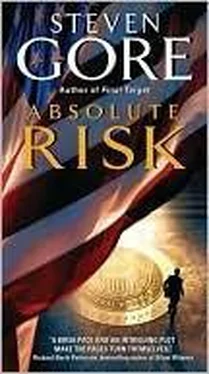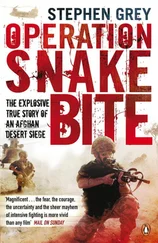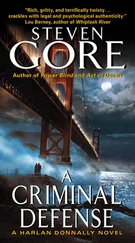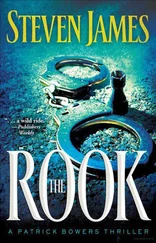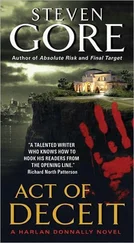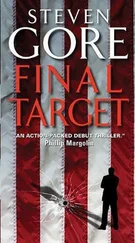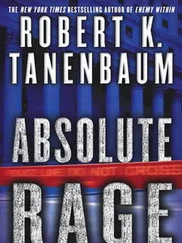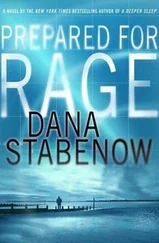Steven Gore - Absolute Risk
Здесь есть возможность читать онлайн «Steven Gore - Absolute Risk» весь текст электронной книги совершенно бесплатно (целиком полную версию без сокращений). В некоторых случаях можно слушать аудио, скачать через торрент в формате fb2 и присутствует краткое содержание. Жанр: Триллер, на английском языке. Описание произведения, (предисловие) а так же отзывы посетителей доступны на портале библиотеки ЛибКат.
- Название:Absolute Risk
- Автор:
- Жанр:
- Год:неизвестен
- ISBN:нет данных
- Рейтинг книги:5 / 5. Голосов: 1
-
Избранное:Добавить в избранное
- Отзывы:
-
Ваша оценка:
- 100
- 1
- 2
- 3
- 4
- 5
Absolute Risk: краткое содержание, описание и аннотация
Предлагаем к чтению аннотацию, описание, краткое содержание или предисловие (зависит от того, что написал сам автор книги «Absolute Risk»). Если вы не нашли необходимую информацию о книге — напишите в комментариях, мы постараемся отыскать её.
Absolute Risk — читать онлайн бесплатно полную книгу (весь текст) целиком
Ниже представлен текст книги, разбитый по страницам. Система сохранения места последней прочитанной страницы, позволяет с удобством читать онлайн бесплатно книгу «Absolute Risk», без необходимости каждый раз заново искать на чём Вы остановились. Поставьте закладку, и сможете в любой момент перейти на страницу, на которой закончили чтение.
Интервал:
Закладка:
Gage was watching from the dining table of a vacation cottage in La Ciotat, east of Marseilles, belonging to the parents of a colleague of Tabari’s. The house was anchored to an oak-treed hillside high above a narrow fishing port lined with tiny night-lit restaurants and slowly rocking trawlers. Lying before him was Hennessy’s cell phone, along with the SIM and memory cards and his notebook. All were drying by the warmth of a space heater.
Gage hoped CNN International would stay with the press conference until the end.
Harris gestured toward the two ex-presidents standing behind him to his left, then said, “We… are… not… crooks.” And then toward the heads of the Big Four accounting firms to his right. “And these men and women aren’t Arthur Andersen and they are in no way willing to betray their clients and shareholders and the public in pursuit of fees.”
The camera drew back in time to catch the hand of The Nation’s Ivan Kahn shooting up from the crowd of reporters seated in the room. His body followed it upward and he began speaking.
“Then there really are assets of two trillion dollars held by Relative Growth?”
Harris ignored the questioner, but answered the question from his prepared remarks.
“We’ve spent over fifty million dollars to obtain four independent audits of the holdings of the funds.”
Kahn cut him off. “That just means you kept moving money around so it would be counted over and over.”
Harris now acknowledged him.
“What paper are you with?” Harris asked, his face flushing. “The Socialist Workers Gazette?” He paused, then jabbed a forefinger at Kahn. “I told you, the assets are there.”
“Then open your books.”
“So everyone in the world can imitate us? So every day trader in the world gets the results of hundreds of millions of dollars’ worth of research for free? “ Harris raised his forefinger. “Our advantage over others-our only advantage-in the world of finance is our ability to identify opportunities and capitalize on them before anyone else even figures out they exist. Opening our books is the same thing as revealing our trade secrets.”
Harris glanced back at Lucille Nonini, head of AccountCorp Worldwide. “You want to take this? “
Nonini stepped up next to Harris.
“We’ve looked at the books,” Nonini said. “And we did a lot more than that, more than any accounting firm or group of accounting firms ever has. In a matter of a week, we fielded five thousand accountants throughout the world who took simultaneous snapshots of all of the funds’ holdings. There was no opportunity to move money around or transfer assets from one account to another.”
Harris leaned over the podium and pointed at Kahn.
“The kind of false accusations that you and others have made triggered redemption demands by our clients and the only way to dissuade them was to disclose more about our investment strategy than even our investors have the right to know.”
A couple of reporters laughed. Others shook their heads.
Harris’s face flushed and he pounded the top of the podium. “Investors have a right to a share of our profits, not to our methods.”
“What about off-balance-sheet liabilities like Citibank hid in structured investment vehicles?”
Harris shook his head and glared down as though he was about to throw aside the podium and jump Kahn.
“Read… my… lips. There’s nothing-nothing-that’s not included on our balance sheet.”
Harris thinks he’s telling the truth, Gage thought, but it couldn’t be true. There was no way they could’ve kept paying out dividends unless they were doing it with other investors’ money. Not throughout the massive economic upheavals of the last decade. And calling them chaos funds, as Harris and Minsky usually did, wasn’t an explanation, it was just a label, a marketing gimmick.
The camera operator seemed to anticipate that the next question would come from Kahn and framed his face.
Kahn glanced at the camera, the attention seeming to act as an invitation.
“What about liabilities? “ Kahn asked.
Harris rolled his eyes and said, “What do you think the bottom line of an audit is composed of? It’s assets minus liabilities.”
“That’s not what I meant and you know it. I’m asking about liabilities arising out of complex derivatives. If no one has developed a method of pricing them, then how can anyone estimate the liabilities that arise out of holding them? “
Minsky walked forward. Harris stepped to the side.
“We’re a hedge fund,” Minsky said, “and hedging means, among other things-and without giving away our trade secrets and intellectual property-that we take countervailing positions. One part of the economy goes down, another goes up. One currency depreciates, another appreciates.”
Minsky smiled as though he was dismissing a waiter who’d splashed the water onto the tablecloth as he poured it from a pitcher.
“In any case,” Minsky said, “they’re not all that complex and therefore not that hard to value.”
A camera again focused on Kahn’s face, but he remained silent. Gage didn’t think he was alone in seeing in Kahn’s eyes not the aggression he’d displayed before, but a kind of dread. Minsky’s answer had been too simple, his manner had been too slick, and if he was lying, Relative Growth would someday collapse and take the world economy with it. The camera drew back, displaying Kahn standing alone, like a man at the seashore watching an approaching tsunami.
Gage looked from them to the drying notebook and the SIM and memory cards and suspected that the answers about Relative Growth that those at the press conference were searching for might lie concealed before him on the table. He looked at his watch. In another twelve hours he’d know what was in there, Faith would be out of China, and he’d be on his way back to New York and to the beginning of another trailhead.
CNN cut away to the floods in Paris.
Gage turned down the sound, but left the picture on in case coverage continued. He then went into the bathroom and retrieved an electric hair dryer and then returned and focused the streaming heat on the back of the notebook.
The television screen flashed red and white with breaking news: “Mine Collapse in China.”
Gage reached for the remote and increased the volume. An earthquake aftershock in Sichuan Province had triggered the cave-in. Three hundred miners were trapped and feared crushed or asphyxiated. The satellite image on the monitor behind the announcer disappeared, replaced by a grainy and jumpy cell phone video, wives and mothers screaming and weeping on either side of the mine entrance, PLA troops using plastic shields to create barriers to hold them back. The area was gray with mist and low clouds.
It cut to young men rocking a black Land Rover, the bodies of the suited men inside jerking around, shoulders and heads smashing into the windows and against one another. Soldiers stood at the perimeter, not intervening. The SUV went up on two wheels, then back down. Up on two wheels again, then back down, bouncing and rocking when it hit the ground. Then up again on two wheels, hesitating, balancing, then slamming onto its side and mud splattering and men climbing up and stomping on the glass The image was replaced with another. An old woman, tears flowing, staring at the camera as though she knew the world was watching. The voice-over translation failing to capture the fury in her words and tone.
“They all knew… everyone knew it would collapse.” She jabbed her hand at an unseen enemy. “They forced the men to work. Work or starve. Work or die.”
Gage knew from growing up in Southern Arizona that what she really meant was: work and die. The trapped and dead were no different than the Mexican zinc and copper miners in the 1950s, paid cheap wages to keep the white workers’ wages depressed, forced to work unprotected in the dust, their union leaders beaten and murdered, those who chronicled their struggle in print and film arrested Gage reached for his cell phone.
Читать дальшеИнтервал:
Закладка:
Похожие книги на «Absolute Risk»
Представляем Вашему вниманию похожие книги на «Absolute Risk» списком для выбора. Мы отобрали схожую по названию и смыслу литературу в надежде предоставить читателям больше вариантов отыскать новые, интересные, ещё непрочитанные произведения.
Обсуждение, отзывы о книге «Absolute Risk» и просто собственные мнения читателей. Оставьте ваши комментарии, напишите, что Вы думаете о произведении, его смысле или главных героях. Укажите что конкретно понравилось, а что нет, и почему Вы так считаете.
